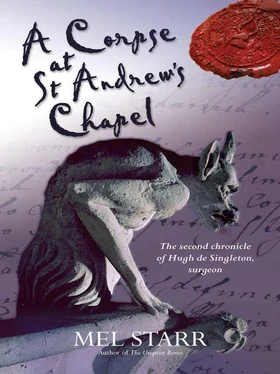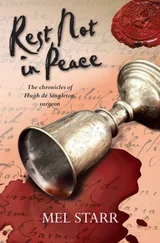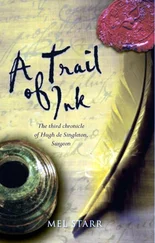Mel Starr - A Corpse at St Andrew's Chapel
Здесь есть возможность читать онлайн «Mel Starr - A Corpse at St Andrew's Chapel» весь текст электронной книги совершенно бесплатно (целиком полную версию без сокращений). В некоторых случаях можно слушать аудио, скачать через торрент в формате fb2 и присутствует краткое содержание. Год выпуска: 2010, Издательство: Kregel Publications, Жанр: Исторический детектив, на английском языке. Описание произведения, (предисловие) а так же отзывы посетителей доступны на портале библиотеки ЛибКат.
- Название:A Corpse at St Andrew's Chapel
- Автор:
- Издательство:Kregel Publications
- Жанр:
- Год:2010
- ISBN:нет данных
- Рейтинг книги:5 / 5. Голосов: 1
-
Избранное:Добавить в избранное
- Отзывы:
-
Ваша оценка:
- 100
- 1
- 2
- 3
- 4
- 5
A Corpse at St Andrew's Chapel: краткое содержание, описание и аннотация
Предлагаем к чтению аннотацию, описание, краткое содержание или предисловие (зависит от того, что написал сам автор книги «A Corpse at St Andrew's Chapel»). Если вы не нашли необходимую информацию о книге — напишите в комментариях, мы постараемся отыскать её.
A Corpse at St Andrew's Chapel — читать онлайн бесплатно полную книгу (весь текст) целиком
Ниже представлен текст книги, разбитый по страницам. Система сохранения места последней прочитанной страницы, позволяет с удобством читать онлайн бесплатно книгу «A Corpse at St Andrew's Chapel», без необходимости каждый раз заново искать на чём Вы остановились. Поставьте закладку, и сможете в любой момент перейти на страницу, на которой закончили чтение.
Интервал:
Закладка:
I cannot now explain why I did not feel sympathy for Philip. He deserved it, heaven knows, although at the moment, ’tis true, only heaven knew why. I did not, but might have guessed. Then, had I been more gentle with the baker I might not have learned the truth. At least, that part of the truth he knew.
I placed the coins in my pouch and moved to the door but did not leave. I turned back to the baker and said, “Your wife seemed much aggrieved but a little time past.”
Philip stiffened as if a dagger had pricked him between the shoulders. My remark was not a question, so Philip did not answer. I continued.
“It seems you have angered both smith and wife.”
“Edmund is known for ’is temper,” the baker mumbled, “an’ no man lives who has not sometime offended ’is wife.”
As he spoke his shoulders drooped, like a scarecrow with the support pole removed. “Then why,” I countered, “swing a hammer at a strong man known for his rage?”
“’Twas done in heat,” the baker replied softly, but would say no more.
I left him, crestfallen, toying with the scar on his neck. There was a matter here I did not know. Perhaps I had no need to know of it. But I am Lord Gilbert’s bailiff. Any business which might lead to blows exchanged on his demesne becomes my business. So I must concern myself with the dispute between baker and smith as well as search out a murderer. The death of Alan the beadle, how so it may have happened, was receding from my thoughts. It should not have, for these three incidents were entwined, although I had no clue yet that this was so.
Chapter 9
Many hours that week I spent prowling the darkened parapet of Bampton Castle. This perambulation helped order my mind, but no matter how I sorted and arranged what I knew, I was no closer to identifying a killer. Few in Bampton or the Weald seemed much disturbed by my failure. Even Thomas de Bowlegh mentioned the matter but as a passing comment when we met on the street on Thursday.
And the normal work of May occupied my thoughts so that with little effort I was able to forget Henry atte Bridge. Until Sunday. No sooner had I passed from porch to church than I saw the three vicars and their clerks preparing for matins. I imagined that Simon Osbern peered reproachfully at me. Perhaps it was not my imagination.
Then during the mass Father Thomas read from the Epistle to the Romans: “Christ died for us while we were yet sinners.” He lifted his eyes while he read and seemed to gaze at me. This passage I knew well. Perhaps I needed to be reminded that the Lord Christ died for Henry atte Bridge as well as for me. And to take his life was as great a sin as to murder King Edward. Perhaps not in the eyes of men, but if I wished to be weighed in God’s balance and not be found wanting I must amend my ways and see men as God sees them.
These thoughts tumbled through my mind at dinner and into the afternoon, when once again archers, their families, and spectators, lined the castle wall to practice their skills and drink Lord Gilbert’s ale.
Onlookers came and went as the sun sank toward Lord Gilbert’s forest to the west of the castle. One of the late arrivals had not attended the previous competitions. John Kellet made his way to the cask and drew a mug of ale, then stood in conversation with others who had temporarily put bows aside to quench a thirst.
I paid the newcomer scant attention until I noted from the corner of my eye a figure being pushed to the mark. It was the rotund, black-clad form of John Kellet.
Others at the mark made room as the priest was thrust, with much laughter and jesting, to the mark. One took his empty cup, another placed a bow into his hands, and a third brought forth a quiver of arrows and a glove.
The priest of St Andrew’s Chapel held the bow comfortably, notched an arrow, grinned at his audience, then drew the bowstrung across his expansive belly. I watched in amazement as the parson took careful aim and loosed the arrow. He missed.
Much hooting and laughter followed. Kellet grew red in the face. He drew another arrow from the quiver, notched it and drew the bow. No smile played about his lips; they were drawn tight across his teeth. His audience grew silent, awaiting the arrow’s release. When it came all heads turned to follow its flight. The arrow struck the center of the butt with a solid “thwack.”
Cheers and merry exclamations followed, subsiding only upon the release of the third arrow, which also found its mark. The priest launched twelve arrows at the target that day and missed but twice. He left the mark, the quiver empty, with many clapping him on the back and complimenting his eye.
Hubert Shillside had attended the competition this day, perhaps to inspire his son, whose competency surely needed encouragement. I saw the man leaning against the castle wall, watching with his son, as John Kellet sent arrow after arrow thudding into the butt.
I sauntered through the crowd to where Shillside and his son were propped against the wall. “A surprising performance,” I said.
But the haberdasher did not seemed over-surprised, although he did agree with me. “Aye…he missed twice. Lack of practice, surely. And a strange bow.”
I was taken aback by this remark until I understood that the astonishing thing about Kellet’s performance was not that he had hit the target ten times, but that he had missed twice.
“Before he took holy orders he’d not have missed once at twice the distance,” Shillside remarked by way of explanation.
“He was skillful as a younger man?”
“Few could best him.”
“I have not seen him at the mark, or even in attendance, before this day.”
“’Tis said he was warned away. The vicars of St Beornwald’s Church thought it unseemly for a man who chose a vocation to disport himself so of a Sunday afternoon.”
“They will not be pleased, then, to learn of his lapse this day.”
“If they are told,” Shillside winked. “All here know the tale, but I think none would see poor John come to grief for a few arrows on a pleasant afternoon.”
“Poor John?”
“Aye. He has but a thin living from that chapel, and no kin since his mother died…and that many years past.”
“How did he come to be at the chapel?”
“He was left an orphan. Father Simon was new at St Beornwald’s Church, from Exeter. He took ’im in as servant an’ made place for ’im. John was quick an’ soon learned the words of holy office, though he could not read, of course. A great mimic, ’e was. When St Andrew’s Chapel fell vacant the rector could find none willing to accept so slender a living. Kellet volunteered. Was made clerk one day and ordained the next.”
“He seems adequately rewarded for his exile there,” I commented. “He has missed few meals of late.”
“Aye,” Shillside agreed. “There is that. Does well from confessions, ’tis said.”
“I have heard he does not assign a rigorous penance.”
“So ’tis said. An’ there be those willing to pay a priest well for his…uh, understanding.”
“And the vicars of St Beornwald’s? They are not troubled?”
“Who can say? If they saw him removed, who could be sent to replace him? An’ as ’tis, he lives without taking much of the bishop’s purse. I think our vicars know they would not have the good bishop’s ear should they complain. ’Tis a sleeping dog best left to lay as is.”
“It was while he served Father Simon that he learned to handle a bow?”
“Nay. As a tyke he’d follow his father of a Sunday afternoon. Odo Kellet was skilled. He was at Crecy. John practiced with a bow ’is father made for ’im when he was but a wee lad.”
“And when he went to Father Simon he was allowed to continue his practice?”
Читать дальшеИнтервал:
Закладка:
Похожие книги на «A Corpse at St Andrew's Chapel»
Представляем Вашему вниманию похожие книги на «A Corpse at St Andrew's Chapel» списком для выбора. Мы отобрали схожую по названию и смыслу литературу в надежде предоставить читателям больше вариантов отыскать новые, интересные, ещё непрочитанные произведения.
Обсуждение, отзывы о книге «A Corpse at St Andrew's Chapel» и просто собственные мнения читателей. Оставьте ваши комментарии, напишите, что Вы думаете о произведении, его смысле или главных героях. Укажите что конкретно понравилось, а что нет, и почему Вы так считаете.












